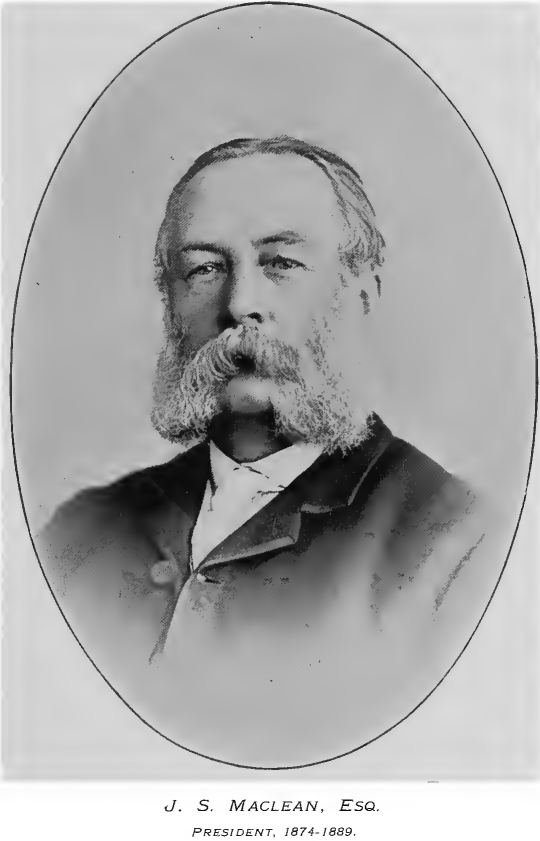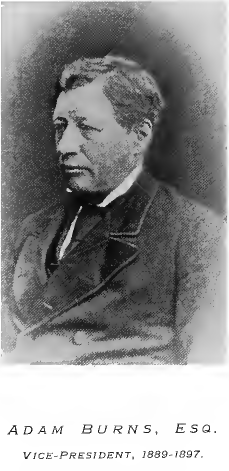|
Halifax, 15th February,
1882.
IN pursuance of the usual notice, the Annual General Meeting of the
Shareholders of the Bank was held in the Banking House this day, the
President in the chair. The following Shareholders were present, viz.:

The Minutes of the last
Annual Meeting havipg been read and approved, the report of the
condition of the Bank as at 31st December last was read to the meeting.
The President, in moving the adoption of the report, called the
attention of the meeting to the fact that this was the Bank's Fiftieth
Anniversary. He turned to the Minutes of the first General Meeting of
the Bank and read the names of the original Shareholders and Directors,
only one of whom, Mr. John Metzler, is now living. He also gave an
interesting comparison of several of the Bank's reports of different
years, showing the progress which had been made, and said he confessed
to feeling a little elated at being able-to present such a statement to
the Shareholders as they had before them.
His Lordship, the Bishop, seconded the adoption of the report, and while
congratulating the President and Directors on the very satisfactory
exhibit which they had made, said there was just one thing he would
speak of which he thought perhaps the Directors might have done— he
referred to his suggestion of last year—that on the occasion of the
Bank’s Fiftieth Anniversary, a bonus to the Shareholders would have been
rather appropriate, considering that they had had so large an amount to
add to the Reserve Fund. He could hardly find fault however with the
Directors while they were doing so well, and he had much pleasure in
seconding the adoption of the report.
Mr. Burns was of a different opinion from his Lordship in regard to the
addition to the Bank’s Rest. He thought the Directors had done just
right in that matter, as in the Bank’s fiftieth year they had added
$50,000 to it, or $1,000 for every year they had been in existence. He
had recently been looking into the published statements of a large
number of Banks and Insurance Companies, and he was struck with the fact
that the best of them—those in the highest standing—had all very large
Reserve Funds. He mentioned the Norwich Union Insurance Company, the
Union Bank of Newfoundland, and the Chemical Bank, of New York, and he
hoped to see the day when the Reserve of this Bank would be as large as
its Capital. It was no loss to the Shareholders; on the contrary it was
greatly to their benefit, as they got liberal and steady dividends, and
they could sell their stock in the market, if they wished, at a
correspondingly high price.


The Hon. James Fraser
rather dissented from his friend, Mr. Burns. He was not much in favor of
paying high dividends, or of paying out everything that was earned, but
he thought that when large dividends were earned, they should be paid.
Mr. W. C. Silver remarked that everything indicated at the present time
that we were in a period of general prosperity. He said that these
periods of prosperity came in waves and always alternated with times of
general dullness and depression. He illustrated his remarks by referring
to the returns of imports and exports, which showed the extreme
fluctuations to which trade was subject. The present time was
undoubtedly a prosperous one, but we might look forward to a very
different state of things, and that in a very few years; when no such
figures as $9,800 and $10,200 would cover our overdue notes and overdue
debts secured, as they do in the present balance sheet now submitted. He
therefore thought that the Directors were acting very prudently in
saving all they could at the present time.
The President then introduced the subject of an increase of the Bank’s
stock. He explained that it seemed probable from what had already come
before the Directors, that several small country Banks in the Lower
Provinces might decide before long to amalgamate with other institutions
; and they wished this Bank to be in a position, if possible, to take
advantage of any such opportunity, if definite proposals for
amalgamation were made to them. He explained that any amalgamation could
most advantageously be made by giving the shareholders of the other bank
our stock at a fair valuation. After some little discussion of the
matter, the following resolution was read:
“It having appeared to the Directors that several of the smaller Banks
in the Lower Provinces may desire to become amalgamated with larger
institutions, to their mutual benefit as well as that of the community
at large, therefore', Resolved, that, in view of the advantages that may
be secured to this Bank by any such amalgamation, the Directors are
hereby authorized to apply to Parliament for power to increase the
Capital of the Bank to an amount not to exceed $2,000,000; (Two Million
Dollars) no part of such additional stock to be issued without the
consent of the Shareholders at a special or general meeting to be called
for that purpose.”
This resolution was proposed by Mr. Silver, seconded by Mr. Parker, and
passed unanimously.
After a vote of thanks had been passed to the Directors and Officers of
the Bank for their successful management of its affairs, the meeting
proceeded to the election of Directors. Mr. Parker and Mr. Farquhar were
appointed scrutineers, and they declared the result of the voting to be
the unanimous re-election of the old Directors.
(Signed) J. S. Maclean,
Chairman. |
